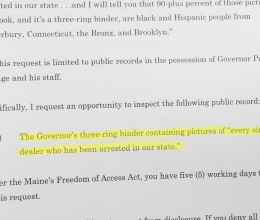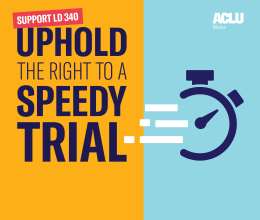The following was originally posted at aclu.org.
At a town hall meeting in North Berwick, Maine, last week, Gov. Paul LePage stated he keeps a binder with pictures of “every single drug dealer who has been arrested in our state.” He went on to claim that 90 percent of those arrested are Black or Hispanic. Naturally, we want to see the binder — so we filed apublic access request for it.
We’re eager to examine the governor’s binder to get to the bottom of his claims. Unfortunately, while the governor spent much of the last week waving around supposed pages from the binder and offering to show it to people who challenged him, he now seems less eager to share it. On Wednesday night, we received the following in response to our request:
“Given the workload of staff and the fact that we have received multiple requests to inspect this file (as opposed to being provided a copy of the file), we anticipate that it could take two to three weeks to complete this request.”
We’re disappointed that the governor’s office is delaying the release of these records. Our request was narrowly tailored and should be simple to fulfill. Further, the records in question pertain to matters of utmost importance to the Maine people, and their release is essential to a fully informed public discussion.
Without the binder, we can’t know exactly what information the governor is relying on to support his claim. But we do know there are at least two major problems with it.
First, it’s beyond belief that nine out of 10 people selling drugs in Maine are Black. So if nine out of 10 people being arrested for selling drugs are Black, we have a serious problem. Studies show that Black people and white people use and sell drugs at similar rates. Significant disparities in arrests, such as the nine-to-one disparity suggested by Gov. LePage, can almost surely be attributed to racial profiling and selective enforcement by police officers.
Second, Gov. LePage’s claim is contradicted by facts. According to data provided to the Bangor Daily News by the Maine Department of Corrections, 70 percent of prisoners in the Maine prison system with a charge that includes drug trafficking are white. If that’s the case, why is Maine’s governor exaggerating the number of drug dealers in Maine who are people of color? Why is he making this about race at all?
Sadly, throughout the week the governor has only doubled down on his claims. In a press conference following the town hall, he said, “When you go to war… you shoot at the enemy. And the enemy right now… are people of color or people of Hispanic origin. I can’t help that. I just can’t help it. Those are the facts.”
No, Gov. LePage, those are not the facts. And targeting people of color as “the enemy” is courting tragedy.
This isn’t the first time we’ve heard racist claims from Gov. LePage. In February, he erroneously claimed immigrants bring disease and the “ziki fly” into the U.S. And at a town hall in January, he referred to drug traffickers this way:
“These are guys with the name D-Money, Smoothie, Shifty. They come up here, they sell their heroin, then they go back home. Incidentally, half the time they impregnate a young, white girl before they leave, which is a real sad thing because then we have another issue that we got to deal with down the road.”
That claim was shocking not only for its ignorance of the truth (ironically, the same night LePage was pointing fingers at D-Money and Shifty, the Maine Drug Enforcement Agency arrested three people for trafficking heroin — all of whom were white Mainers named, as The Washington Post pointed out, James, Jody, and Donna), but also for its roots in the shameful practices of Jim Crow America.
From the end of the Civil War to the middle of the last century, lies about Black men seducing white women were a primary justification for lynching in the United States. Take 14-year-old Emmett Till, who was killed in 1955 after he supposedly flirted with a white woman. LePage’s allusion to Black men from away having sex with white women from Maine was eerily, dangerously reminiscent of those darker times.
When our governor says racist things, they are not simply gaffes that can be brushed away as a slip of the tongue. They are a signal from the highest office in the state that people of color are not welcome here. His words fall not only on the ears of older white Mainers — but also those of young Black and Hispanic Mainers. And they matter.
We urge the governor’s staff to prioritize the release of his binder. In the meantime, we join with the thousands of people in Maine and nationwide who are condemning racism and calling on our elected officials to do better.






